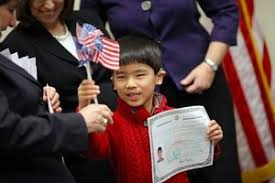Acquiring or Deriving U.S. Citizenship by Birth or Through Parents

If you were born on U.S. soil, were born to U.S. citizen parents, or became a naturalized U.S. citizen and have been living in the United States, you clearly have U.S. citizenship. However, many other people are U.S. citizens and don’t know it. For instance, you may be a U.S. citizen if you have direct ancestors who were U.S. citizens, even if you were born elsewhere, or if your parents became U.S. citizens when you were a minor.
U.S. citizenship can be obtained in one of four ways:
- birth in the United States or one of its territories
- birth to U.S. citizen parents (called “acquisition” of citizenship)
- naturalization (obtaining citizenship after an application and exam), or
- naturalization of one’s parents (called “derivation” of citizenship).
Some people are already U.S. citizens and don’t know it. Most of these people fall into one of three groups:
- People born in the United States who have lived most of their lives in other countries.If you fall into this category, you may mistakenly believe that your long absence from the country, plus voting or military activities elsewhere, have stripped you of U.S. citizenship. This is not the case.
- People who have U.S. citizens in their direct line of ancestry.If your parents or grandparents were U.S. citizens, you may not realize that U.S. citizenship has been passed down the line, even if you were born elsewhere and your parents or grandparents haven’t lived in the United States for a long time.
- Children of naturalized U.S. citizens.When parents become naturalized U.S. citizens, their minor children with green cards gain U.S. citizenship automatically. (Children under the age of 18 cannot normally apply to become naturalized U.S. citizens.)
You will, however, need to do some research to establish your rights. Here, we’ll explore each of the above three possibilities in turn.
Birth in the United States or a U.S. Territory
A child born on American soil automatically gets U.S. citizenship, unless the child is born to a foreign government official who is in the United States as a recognized diplomat.
Children born in certain U.S. territories—Puerto Rico, the Virgin Islands, the Northern Marianna Islands, and Guam—may also acquire U.S. citizenship if at least one parent is a U.S. citizen and was physically present in the United States or one of its outlying possessions for a continuous period of one year at any time before the birth.
Anyone born with U.S. citizenship retains it for life unless he or she deliberately gives it up—for example, by filing an oath of renunciation.
Birth to U.S. Citizen Parents (“Acquisition”)
In many circumstances, even though a child is born outside the United States, if at least one parent was a U.S. citizen at the time of the child’s birth, the child automatically “acquires” citizenship. When this child marries and has children, those children may also acquire U.S. citizenship at birth.
The laws governing whether or not a child born outside of the United States acquires U.S. citizenship from parents have changed several times. You’ll need to look at the law that was in effect on the date of the child’s birth (and the parents’ birth, if grandparents were U.S. citizens who might have passed it down to the parent) for guidance. These laws differ for the following time periods:
- prior to May 24, 1934
- May 25, 1934 to January 12, 1941
- January 13, 1941 to December 23, 1952
- December 24, 1952 to November 13, 1986, and
- November 14, 1986 to present.
Naturalization of Parents (“Derivation”)
When a parent naturalizes, his or her children may “derive” U.S. citizenship automatically, provided they have green cards and are under age 18 and living with the parent at the time.
Becoming a U.S. citizen in this way has a special benefit: A child who gets U.S. citizenship through the naturalization of either or both parents does not have to participate in a naturalization ceremony.
The laws on the automatic naturalization of children have varied over the years. Whether or not you are a U.S. citizen is determined by the laws that existed when your parent’s naturalization took place. These laws differ for the following time periods:
- parents who naturalized before May 24, 1934
- parents who naturalized between May 24, 1934 and January 12, 1941
- parents who naturalized between January 13, 1941 and December 23, 1952
- parents who naturalized between December 24, 1952 and October 4, 1978
- parents who naturalized between October 5, 1978 and February 26, 2001, and
- parents who naturalized between February 27, 2001 and the present.
Proving Your U.S. Citizenship
If you have a claim to U.S. citizenship based on one of the laws discussed in this article, you should acquire a passport or other document to prove it. To learn more please contact one of our experienced immigration lawyers in New York today at 718-407-0871 or online at https://www.prizant-law.com .
Contributed by Svetlana Prizant, Esq., an Award Winning New York Immigration Lawyer
Call or visit Prizant Law at:
Prizant Law
118-21 Queens Blvd Suite 507
Forest Hills, NY 11375
(718) 407 0871
